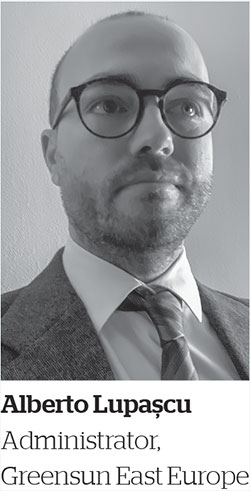Interest in photovoltaic energy comes returns Romania. Unlike the previous period of effervescence, this time two other categories of clients participate actively in the new developments: owners of buildings willing to become prosumers and companies interested in reducing first their electricity bills and then the CO2 footprint. We learned from Alberto Lupașcu what animates and what still blocks the market of electricity production from solar sources.
Solar power is one of the great promises of the moment in Romania’s energy, some even talking about a boom. Do the market signals you receive confirm this idea?
 Solar power is present on the Romanian market since 2010, a period in which we also started our local activity, providing photovoltaic equipment at Utility projects level. What happens today in Romania is the natural order of things, meaning adaptation of the energy market. Today, the local market gives strong signals of interest in the photovoltaic industry.
Solar power is present on the Romanian market since 2010, a period in which we also started our local activity, providing photovoltaic equipment at Utility projects level. What happens today in Romania is the natural order of things, meaning adaptation of the energy market. Today, the local market gives strong signals of interest in the photovoltaic industry.
One of the advantages of solar power is the constant reduction of costs with equipment, over the past few years. Is this trend maintained?
Indeed, the trend of the equipment market was downward in terms of prices starting with 2015, but due to the current global context, Covid-19 and lack of raw materials, starting with last year there were significant increases in prices. We are talking especially about photovoltaic panels, where an average increase in prices by 20% was recorded. For mounting systems, the increase was on average by 10%, for those specific to roofs, and over 15% for ground mounting systems. The trend for the following two quarters remains upward.
Are there still big names in solar power that we don’t find yet in Romania? Why? What could attract them in the near future on the domestic market?
Currently, Romania, also with our help, is on the radar of the most important manufacturers of equipment in the industry and investors. However, being at an early stage, in which many legislative amendments take place, it does not attract enough appetite yet. Probably stable and clear legislation in our field would help even more integrate green energy in the domestic market.
An advantage is related to scalability and versatility. In other words, solar technology is suitable for both large solar parks and industrial users, commercial spaces, public buildings and prosumers – natural persons. How do these segments evolve and which of them is more dynamic in this period? Why?
On the Romanian market, today we can identify three large categories of demand for solar technology. The residential segment includes natural persons who, which with their own funds or with the help of public programs have access to this technology. These are the emblem of this segment and are also the first customers to set the market in motion after 2018. The commercial segment refers to legal persons that, in general, install capacities of over 100 kW, thus reducing their direct costs with the electricity consumed, by generating “green” electricity in their own photovoltaic power plants. Currently, this is the most dynamic segment.
In the end, the utility segment refers to large photovoltaic power plants. We are talking about medium and long-term projects, aimed to produce large-scale clean energy to be injected into the national grid. Today, from public information, we learn that there are projects with a total installed power of over 1GW under discussion.
When comes to choosing quality PV equipment, what is that we should focus on?
A very important role in choosing the equipment of a PV system is its proper sizing. Each producer of panels and inverters has its own technology design, efficiency, durability and a specific warranty. In the case of the inverter, you must take into account its efficiency, the continuous input voltage, the alternative output voltage, the frequency and the appropriate circuits. The panels must offer high yields and good efficiency, in addition to the guarantees given by the manufacturer for the product and its efficiency over time
From the Greensun perspective, how have things changed in the recent 2-3 years, characterized by both the shock caused by the Covid-19 pandemic and the great repositioning of the EU on green energy, with more ambitious targets and stronger restrictions for competing technologies?
All the above-mentioned factors, such as Covid-19, European legislation through the “Green Deal” project, as well as the global economic context, focused on using renewable sources for the production of electricity and avoiding CO2 emissions, had a great impact on local electricity consumers. Therefore, interest in renewable energy projects has increased significantly. Today we are actively involved together with such consumers to identify “green” and environmentally friendly solutions.
Which of the promises launched by the authorities in Romania do you see as being more useful for the development of the domestic solar power market and which do you think will materialize sooner?
All the initiatives launched by our authorities are aimed at adaptation to the European context and improving the domestic market. It is clear that, being in a new period of transition of the electricity market, we need to be patient and think about their impact in the long run. My opinion is that the most appreciated and immediate change with a significant impact that we are waiting for in the near future will be the law on direct compensation.
—————————————-
This interview first appeared in the printed edition of Energynomics Magazine, issued in June 2021.
In order to receive the printed or electronic version of this issue of Energynomics Magazine, we encourage you to write us at office [at] energynomics.ro to include you in our distribution list. All previous editions are available HERE.
